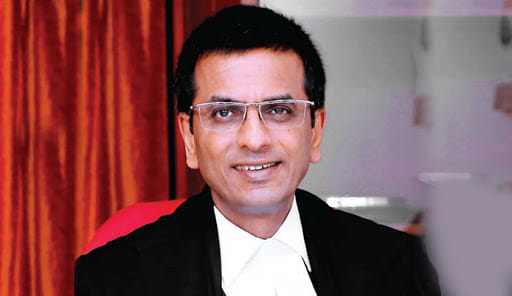New Delhi: Criminal law, including anti-terror laws, “should not be misused for quelling dissent or harassment of citizens”, Supreme Court judge Justice D.Y. Chandrachud said Monday.
Justice Chandrachud was speaking at the Indo-US Joint Summer Conference. The online conference was titled ‘New challenges and shared interests between US and India’ and its organisers included the American Bar Association’s (ABA) International Law Section, and the Society of Indian Law Firms (SILF).
Justice Chandrachud’s address focussed on the “role of the Supreme Court in protecting fundamental rights in challenging times”.
Addressing the conference, he reiterated his observations in the Arnab Goswami case, in which the court had observed, “Our courts must ensure that they continue to remain the first line of defense against the deprivation of the liberty of citizens. Deprivation of liberty even for a single day is one day too many. We must always be mindful of the deeper systemic implications of our decisions.”
The judgment in the case was authored by Justice Chandrachud, on behalf of himself and Justice Indira Banerjee. The verdict had also said, “…it is the duty of courts across the spectrum — the district judiciary, the High Courts and the Supreme Court — to ensure that the criminal law does not become a weapon for the selective harassment of citizens.”
Justice Chandrachud’s remarks come amidst outrage over the death of 84-year-old activist Stan Swamy, who was an accused in the Elgar Parishad case. Swamy had been arrested in October last year and died last week in Mumbai while his bail plea on health grounds remained pending in the Bombay High Court.
‘American influence’ on Indian Constitution
Justice Chandrachud also spoke about “American influence” on the Constitution, saying that it “contributed to the heart and soul of the Indian Constitution — the fundamental rights under Articles 14 to 32”.
He also referred to his judgment in the Navtej Singh Johar verdict, which read down Section 377 of the Indian Penal Code and declared it unconstitutional so far as it penalised consensual sexual acts between adults.
Justice Chandrachud said that the Indian Supreme Court has often relied on jurisprudence emanating from the US. He said, “For instance, in my opinion in Navtej Johar v. Union of India, where the Indian Supreme Court decriminalised same-sex sexual intercourse, I relied on comparative law developments from the UK, European Court of Human Rights and the celebrated case of Lawrence v. Texas of the US, to hold that there was a growing liberal consensus towards equal treatment of LGBTQ rights and India could not be left behind in this transformational vision.”
Similarly, he pointed out that in the right to privacy judgment, “specific comparison was made with the United States”.
Also read: ‘Shocking, terrible’ that people still booked under scrapped Section 66A of IT Act, SC says
From migrant labourers to vaccinations
Justice Chandrachud also spoke about the Supreme Court, asserting that it “has a wide reach over its population, executive and lower courts, and provides greater access to individuals by exercising not just its appellate jurisdiction, but also its writ jurisdiction in protecting fundamental rights enshrined in the Constitution”.
Citing examples, he acknowledged that having smaller benches in the Supreme Court “provide a possibility of reading the law differently” by different benches. However, he added that “multiple benches of the Supreme Court allow the court to hear a wide variety of claims and increase the accessibility of the apex court of the country for ordinary citizens”.
He spoke about the challenges that courts had to face during the Covid-19 lockdown, and also said that the pandemic and the lockdown “not only raised questions of personal liberty but also of equality and non-discrimination”. Several Constitutional violations, he said, found their way to the Supreme Court.
He then referred to several cases that the court dealt with during this time. This included the suo motu case on migrant labourers, the issue of congestion in prisons, and the shortage in supply of essential drugs, including vaccinations.
He also said that “the court plays the role of a counter-majoritarian institution and it is its duty to protect the rights of socio-economic minorities”.
Also read: Same family laws for all faiths — what’s Uniform Civil Code, and what courts say about it






